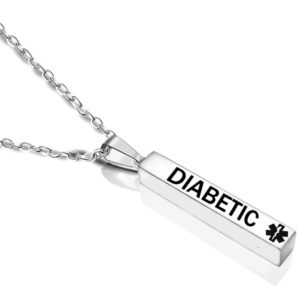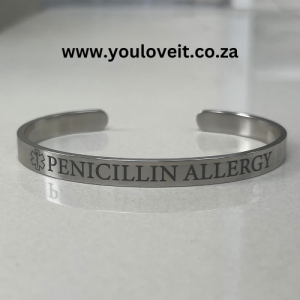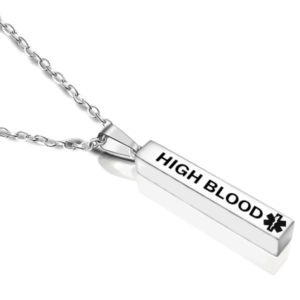Description
Wearing a penicillin alert bracelet offers several important benefits. First and foremost, it serves as a crucial medical identifier, providing quick and accessible information about an individual’s penicillin allergy in emergency situations. This can be vital for healthcare professionals to avoid administering medications that may cause severe allergic reactions. The bracelet acts as a constant reminder to the wearer and those around them, reducing the risk of accidental exposure to penicillin. Additionally, the bracelet enhances communication during medical emergencies, ensuring timely and accurate treatment. Overall, a penicillin alert bracelet plays a key role in promoting safety and preventing adverse reactions for individuals with penicillin allergies.
Here’s how a medical alert bracelet helps healthcare professionals:
- Firstly, Immediate Identification of Medical Conditions:
- A medical alert bracelet quickly informs medical staff about the wearer’s specific medical conditions, such as allergies, chronic illnesses, or critical information like diabetes or epilepsy.
- Allergy Alerts:
- For individuals with allergies, including drug allergies like penicillin or food allergies, the bracelet serves as a prominent warning to medical staff, helping them avoid administering medications or treatments that could trigger adverse reactions.
- Emergency Contact Information:
- Many medical alert bracelets feature emergency contact details. This information can be invaluable for medical staff seeking to quickly reach family members or designated contacts to obtain additional medical history or consent for treatment.
- Patient History and Medications:
- Some bracelets may include a brief medical history or a list of medications the wearer is currently taking. This information assists medical staff in making informed decisions about treatment plans and avoiding potential interactions.
- Chronic Conditions:
- Individuals with chronic conditions, such as heart conditions or epilepsy, benefit from medical alert bracelets. In emergency situations, medical staff can immediately recognize and address the specific needs of these patients.
- Language Barriers:
- In cases where language barriers exist, a medical alert bracelet transcends language and provides clear, concise information that medical staff can quickly understand and act upon.
- Enhanced Preparedness:
- The presence of a medical alert bracelet enhances the overall preparedness of medical professionals. It allows them to anticipate potential complications, consider specific medical needs, and tailor their approach to the patient’s unique health circumstances.
- Lastly, Time-Saving in Critical Situations:
- During emergencies, every second counts. A medical alert bracelet minimizes the time medical staff spend gathering essential information, allowing them to focus on immediate and appropriate interventions.
Here are some notable medical facilities in South Africa:
- Firstly, Groote Schuur Hospital (Cape Town):
- Located in Cape Town, this academic hospital is renowned for its medical research and is associated with the University of Cape Town. Additionally, it gained international recognition for being the site of the world’s first successful heart transplant in 1967.
- Chris Hani Baragwanath Hospital (Johannesburg):
- As one of the largest hospitals in the world, Baragwanath Hospital in Soweto, Johannesburg, serves a vast population. Furthermore, it provides a wide range of medical services and is a teaching hospital associated with the University of the Witwatersrand.
- Netcare Group Hospitals:
- Netcare is a private healthcare provider with hospitals across South Africa. Moreover Netcare hospitals are well-equipped and offer a variety of medical services, including specialized care in areas such as cardiology, oncology, and neurology.
- Mediclinic Hospitals:
- Mediclinic is another major private healthcare group in South Africa, operating hospitals in various cities.
- In addition, these hospitals provide a comprehensive range of medical services, from general healthcare to specialized treatments.
- Steve Biko Academic Hospital (Pretoria):
- Situated in Pretoria, this academic hospital is associated with the University of Pretoria. It is a referral hospital known for its medical education and research programs.
- Charlotte Maxeke Johannesburg Academic Hospital:
- This academic hospital in Johannesburg is associated with the University of the Witwatersrand and provides a wide range of medical services, including specialized care in areas such as trauma, oncology, and transplantation.
- Life Healthcare Hospitals:
- Life Healthcare is a private healthcare provider with hospitals in various cities across South Africa.
- Lastly, Tygerberg Hospital (Cape Town):
- Associated with Stellenbosch University, Tygerberg Hospital is a major academic and research hospital in Cape Town.
These are just a few examples, and there are numerous other public and private medical facilities, clinics, and healthcare centers across South Africa, catering to the diverse healthcare needs of the population.







